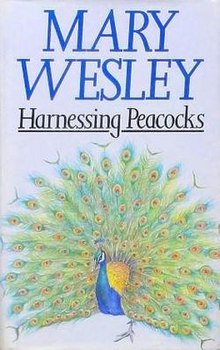
Mary Wesley was the pen name of Mary Aline Siepmann CBE, an English novelist. During her career, she was one of Britain's most successful novelists, selling three million copies of her books, including ten bestsellers in the last twenty years of her life.
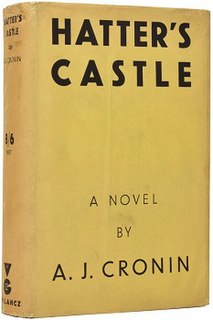
Hatter's Castle (1931) is the first novel of author A. J. Cronin. The story is set in 1879, in the fictional town of Levenford, on the Firth of Clyde. The plot revolves around many characters and has many subplots, all of which relate to the life of the hatter, James Brodie, whose narcissism and cruelty gradually destroy his family and life. The book was made into a successful film in 1942 starring Robert Newton, Deborah Kerr, and James Mason.

At Home with the Braithwaites is a British comedy-drama television series, created and written by Sally Wainwright. The storyline follows a suburban family in Leeds, whose life is turned upside down when the mother of the family wins £38 million on the lottery. It was broadcast on ITV and produced by Yorkshire Television for 26 episodes, from 20 January 2000 to 9 April 2003.

Lucy Christiana, Lady Duff-Gordon was a leading British fashion designer in the late 19th and early 20th centuries who worked under the professional name Lucile.
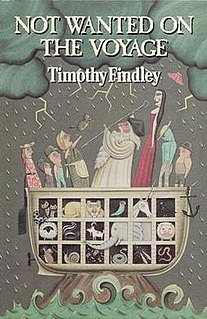
Not Wanted on the Voyage is a novel by Canadian author Timothy Findley, which presents a magic realist post-modern re-telling of the Great Flood in the biblical Book of Genesis. It was first published by Viking Canada in the autumn of 1984, and was a shortlisted finalist for the Governor General's Award for English-language fiction at the 1984 Governor General's Awards.
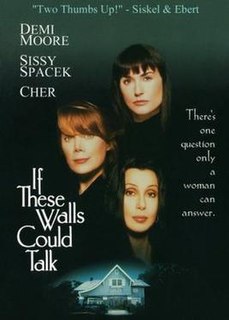
If These Walls Could Talk is a 1996 American television film, broadcast on HBO. It follows the plights of three different women and their experiences with abortion. Each of the three stories takes place in the same house, 22 years apart: 1952, 1974, and 1996. All three segments were co-written by Nancy Savoca. Savoca directed the first and second segment while Cher directed the third. The women's experiences in each vignette are designed to demonstrate the popular views of society on the issue in each of the given decades.
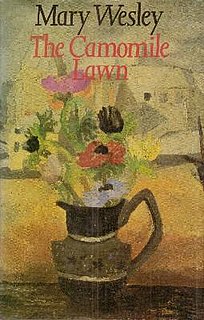
The Camomile Lawn is a 1984 novel by Mary Wesley beginning with a family holiday in Cornwall in the last summer of peace before the Second World War. When the family is reunited for a funeral nearly fifty years later, it brings home to them how much the war acted as a catalyst for their emotional liberation. The title refers to a fragrant camomile lawn stretching down to the cliffs in the garden of their aunt's house.
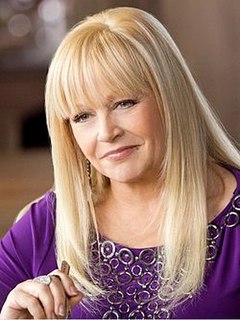
Lucy Ann Ewing is a fictional character in the popular American television series Dallas. The character is played by Charlene Tilton and first appeared in the series premiere on April 2, 1978. Tilton left the show at the end of season 8 in 1985, before returning for the last two episodes of season 11 in 1988, becoming a series regular again in season 12. Lucy was then written out again in 1990.

The Vacillations of Poppy Carew (1986) is a novel by Mary Wesley. The title refers to the protagonist's inability to choose in life. However, when Poppy Carew's boyfriend leaves her, and her father dies, she is forced to make a decision and to learn how to deal with life on her own.
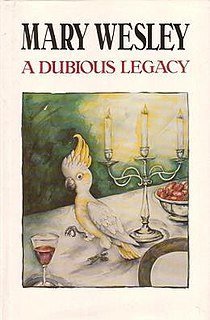
A Dubious Legacy (1992) is a novel written by the British author Mary Wesley. The story takes place in the West Country, England, from 1944 to 1990. It concerns the tragic and bizarre marriage of the Tillotsons and their relationship with two young couples who keep visiting them throughout the years.

Second Fiddle (1988) is a best-selling novel by British author Mary Wesley.
Patrick Marnham is an English writer, journalist and biographer. He was elected as a Fellow of the Royal Society Literature in 1988. He is primarily known for his travel writing and for his biographies, where he has covered subjects as diverse as Diego Rivera, Georges Simenon, Jean Moulin and Mary Wesley. His most recent book, published in September 2020 is War in the Shadows: Resistance, Deception and Betrayal in Occupied France, an investigation into the betrayal of a British resistance network in the summer of 1943.
Harnessing Peacocks is a 1993 British television film directed by James Cellan Jones and starring Serena Scott Thomas, Peter Davison and John Mills. It was adapted by Andrew Davies from the 1985 novel Harnessing Peacocks by Mary Wesley. It was produced by Friday Productions in association with Meridian Broadcasting for the ITV Network, first screened on 9 May 1993 in the United Kingdom and shown in the United States of America on 28 November 1993. The film won the prestigious Golden Nymph award for Best Television Film at the Monte-Carlo Television Festival.

October Baby is a 2011 American Christian-themed drama film directed by Andrew Erwin and Jon Erwin and starring Rachel Hendrix in her film debut. It is the story of a woman named Hannah, who learns as a young adult that she survived a failed abortion attempt. She then embarks upon a road trip to understand the circumstances of her birth. October Baby was inspired by a YouTube video chronicling the life experiences of Gianna Jessen, who was born after a failed abortion attempt.
Pembroke (1894) is a novel written by Mary E. Wilkins Freeman. It is set in the small town of Pembroke, Massachusetts in the 1830s and 40s. The novel tells the story of a romance gone awry and the dramatic events that follow, which entertain the residents of the small town for years after. As one of Freeman's first novels, Pembroke experienced great success in its time and, although it has only recently experienced a comeback in the academic sphere, it is known for being an exemplary piece of New England local color fiction.
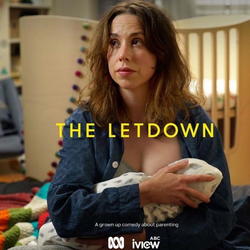
The Letdown is an Australian television comedy series first screened on the ABC in 2016. It follows the adventures of Audrey, including her struggles as a new mum in an oddball mothers' group. She navigates the steep learning curve of motherhood, deals with sleeplessness, shifting relationship dynamics, her issues with her own mother, and her partner's career ambitions.
